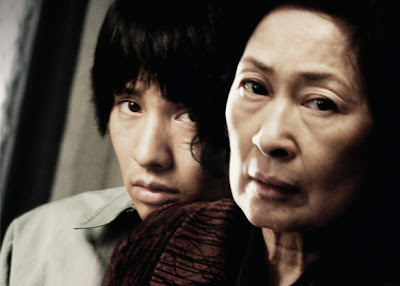Remember Andy García? What a cutie! Well, this is the best work he's ever done. I had never seen him in a comedy, and he is very sweet, likable, convincing and funny as Vince Rizzo, a corrections officer who has a secret desire to be an actor. The corrections officer part, not so believable, as he seems to work in the best behaved jail in the world; but the wants to be an actor part: totally credible.
He reminded me of a police officer, out of central casting, who was in my acting class (yes, my dears, I am a frustrated thespian), but who had trouble wrapping his mind about the whole concept of playing a part (and learning the lines, and acting).
In any case, García is married to Joyce Rizzo, Juliana Margulies, who is almost unrecognizable as a frustrated Bronx housewife with a short fuse. She is not unrecognizable because she is wearing different hair or outrageous makeup. She is just a totally different character from what she usually plays, and she rocks. They have two kids, a college student, played by García's actual daughter (as is the case with many children who get nepotistic breaks, the daughter is one of the weak links in the film) and a smartass teenager played by a talented young man called Ezra Miller, who looks as if he could be Margulies' own son. Seems to me this kid should have a future in Hollywood.
This family, who lives in City Island, the Bronx, all lie to themselves and scream at each other. The plot is mechanical and contrived, but this movie is worth seeing for the intense commitment the actors bring to their roles. Credit goes to director-writer Raymond De Felitta for harnessing their energy in such a refreshing way.
I'd see this movie if only for one scene with my beloved Alan Arkin, who plays Rizzo's acting teacher and has an incredibly funny and true monologue about Marlon Brando and his bad influence on aspiring actors. I was hoping that there would already be an excerpt in You Tube, because this scene is a classic. There is also a wonderful scene where Rizzo goes to an audition and among the throngs of actors lining up around the block, he sees his own acting teacher, memorizing lines. Real and touching.
What I find fascinating about this movie is that for every couple of scenes that have authenticity, there are three more that seem fake. For every great casting choice (García, Margulies, Arkin, Miller), there are three that are much weaker. Some of the writing is funny and fresh and some is ridden with clichés. And there are just too many heavy-handed plot twists that, although charming, seem to be pulled out of a hat.
I did not buy at all Emily Mortimer's character, García's acting classmate. Mortimer is one of those gifted actresses that I find increasigly unlikeable (she is fast becoming the British version of Jennifer Jason Leigh; not a good thing in my book). She's the only person in the film who doesn't seem to be aware that she is acting in a comedy. I don't want to give anything away, but I think an American actress pretending to be a plummy Brit would have been more believable and poignant.
All and all, as idiosyncratic and uneven as it is, I kind of liked City Island.
(230310095933)city_island_5.jpg)






